annual report1-final.qxd - Overseas Indian
annual report1-final.qxd - Overseas Indian
annual report1-final.qxd - Overseas Indian
Create successful ePaper yourself
Turn your PDF publications into a flip-book with our unique Google optimized e-Paper software.
Pravasi Bharatiya Divas<br />
Pravasi Bharatiya Divas<br />
Pravasi Bharatiya Divas<br />
Pravasi Bharatiya Divas<br />
Panelists at the panel discussion on ‘Communal Harmony &<br />
Secularism’ in Hyderabad on January 9, 2006.<br />
the secular nations of the world. In his view, India’s<br />
diversity made it the best suited to lead global efforts<br />
in bringing about communal harmony and peace.<br />
Citing the two alternative definitions of secularism<br />
suggested by Nobel Laureate Amartya Sen —<br />
tolerance of all religions by the State and distancing<br />
of the State from all religions — the speaker indicated<br />
India’s adherence to the first one.<br />
Speaking of experiences of PIOs in Mauritius,<br />
Raouf observed that ironical as it was, the <strong>Indian</strong>s in<br />
his country had turned adversity into advantage by<br />
securing the status of representatives of minority<br />
groups. He praised the Mauritian administration for<br />
instituting the National Unity Awards in that country.<br />
The second speaker, Justice A.M. Ebrahim from<br />
Zimbabwe, opined that emphasis on national identity<br />
and integrity, rather than religious affiliations,<br />
was desirable to promote secularism. He praised<br />
the Hindi film actor Shah Rukh Khan for having<br />
made provision for Hindu, Islamic and Christian<br />
ways of worship at his residence.<br />
In his speech, Shrikumar Poddar cautioned the<br />
media to abstain from identifying a killer as belonging<br />
to any particular religion, for ‘no religion recommends<br />
killing of innocent people’. While he conceded<br />
that ordinary men did not resort to violence,<br />
he also pointed out that lack of protest by them<br />
against violence amounted to tacit support.<br />
Nirmala Deshpande, the well-known follower of<br />
Acharya Vinoba Bhave, enthralled the audience with<br />
her thought-provoking and profound socio-ethical<br />
insights on the issue of communal harmony and secularism.<br />
She said the answer to the question, ‘Who<br />
am I’ should be, ‘I am a proud member of a family!’<br />
She drew attention to the need to realise that different<br />
religions were nothing but various alternative ways<br />
of explaining and understanding the same truth.<br />
“This not only had to be grasped by us but also<br />
needed to be lived in our lives,” she said. She mentioned<br />
the exemplary King Ashoka’s nobility in<br />
regarding himself as a secular ruler, though he was a<br />
Buddhist and preached it in his personal capacity.<br />
Citing a few more glorious instances of religious tolerance,<br />
she recalled that great rulers like the Nizam of<br />
Hyderabad used to arrange Ram Vivah at<br />
Bhadrachalam and the great Chhatrapati Shivaji had<br />
provided for mosques for his Muslim administrators.<br />
In his closing remarks, Oscar Fernandes, the<br />
Chair of the session, made two very pertinent comments.<br />
He pointed out that India’s commitment to<br />
secularism was borne out by the fact that, despite<br />
partition of the country by the British on religious<br />
grounds, India had chosen to be a secular State. He<br />
also rightly cautioned that peace was a pre-requi-<br />
45



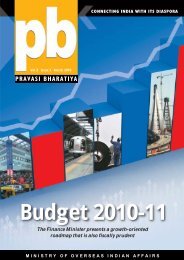
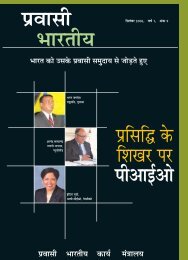

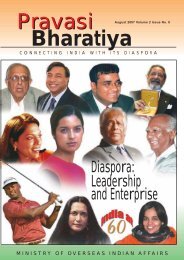

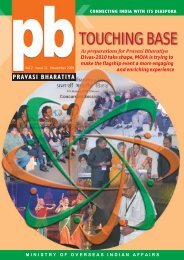
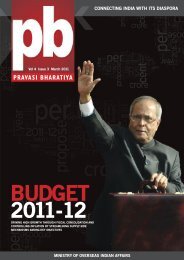
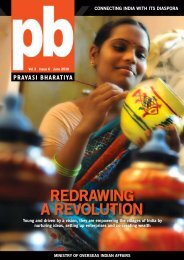
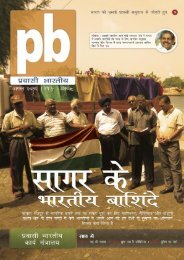

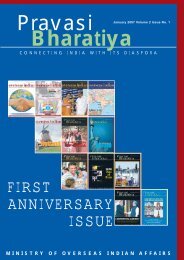
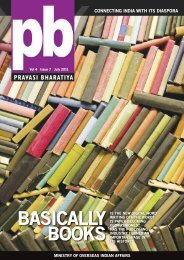
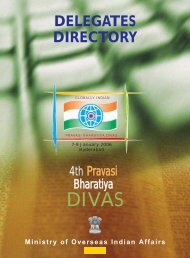
![flaxkiqj feuh izoklh Hkkjrh; fnol] vDVwcj 9&11 - Overseas Indian](https://img.yumpu.com/43977040/1/184x260/flaxkiqj-feuh-izoklh-hkkjrh-fnol-vdvwcj-911-overseas-indian.jpg?quality=85)
